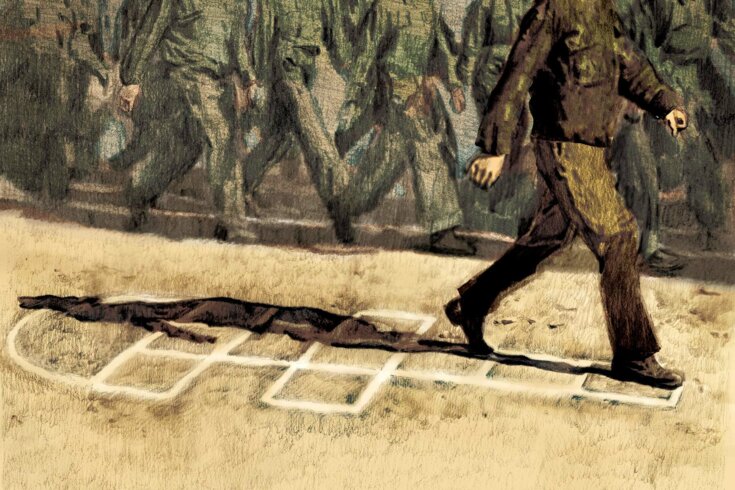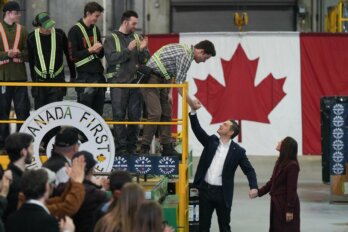Kris could barely contain his excitement when he told his mother he had found the perfect school to attend: a boarding school for boys near Niagara, Ontario, named Robert Land Academy. It was 1996, and Kris, whose last name is being withheld to protect his privacy, was fourteen years old, struggling in middle school in British Columbia. He had dreams of joining the Canadian military, and he became convinced that RLA—its structure mirrored that of the military, with students wearing uniforms and everyone being given military-style ranks—would help him prepare to eventually enlist. Kris and his mother visited the school and were impressed by the sprawling grounds, with a campus modelled after a nineteenth-century British fort, and the administration’s dedication to discipline and academic rigour.
Unbeknownst to them, many students at RLA weren’t there by choice but were sent there by their parents and caregivers as a last resort. Its founder billed the school as a place that could reform young boys into “good citizens,” a place that would help troubled teens who weren’t wanted anywhere else.
Kris’s mother enrolled him to attend that fall. “I realize now,” she recently told me in an email, “this was the gravest mistake as a parent that I ever made.”
Kris and his mother are two of more than twenty-five former students, parents of former students, and former RLA teachers who reached out to me following the publication by The Walrus of my investigation “A Troubled School for Troubled Teens.” The article, based on the stories of ten former students and a parent of a former student, exclusively revealed a series of civil court cases that have been launched against the school, alleging brutal physical punishment by RLA staff, including physical restraint manoeuvres, and other forms of abuse among students that went overlooked by staff.
These new accounts from people describing themselves as former students or former teachers who attended or worked at RLA from the 1990s to the early 2010s, including Kris, echo or expand on The Walrus’s initial investigation—with allegations of them having experienced or witnessed physical, sexual, and verbal abuse at the school.
Shortly after Kris’s arrival at RLA, he became desperate to leave. In letters he wrote to his mother, viewed by The Walrus, he described being yelled at constantly by staff and having to endure intense physical labour as discipline for various infractions. “I get screamed at beside my right ear (It really hurts my ears)…I really hate this place,” he wrote in early September 1996. “The officers [swear] at us and call us names like stupid, idiot, thick skull, etc.” His mother recalls staff warning parents during orientation that their children would say such things to try to convince them to pull them from the school but urging them to ignore their pleadings. So she did.
Kris says he and other students were continuously assaulted by staff physically and verbally. He recalls refusing to do push-ups one day—something he had to do in order to receive food—because he was exhausted. An instructor tackled him to the ground as punishment, he says, and ground his face into the concrete. In a letter to his mother in February 1997, Kris wrote how he failed a bunk inspection and was put into a “correctional training squad.” He described being forced to roll around in dog feces and crawl through a partially frozen pond. “I hate the disciplin [sic] that they give us here,” he wrote. “I miss home.”
Kris returned home for spring break and was determined he would never return to RLA. The morning he was supposed to fly back to the school, Kris ran away, hoping he’d miss his flight. “I found my boy huddled and hiding in a neighbour’s tree fort, pleading for us not to send him back,” his mother told me. If he were to go back, he told her, he feared he would kill himself. RLA offered to send officers to pick him up, but his mother declined and pulled him out of the school for good. The following year, Kris and his mother heard news that two RLA students, Matt Toppi and Christopher Brown, had been struck and killed by a freight train as they were apparently fleeing the school. “That very well could have been my son,” Kris’s mother told me.
The trauma of what Kris endured at RLA lasted through his teenage years and into adulthood. “RLA academy ruined my boy,” his mother told me. “From a fun-loving, creative character, his personality changed as soon as he was home.” Kris started getting into fights at school and began struggling with drugs and alcohol. He was expelled in grade eleven and entered into his first alcohol recovery program at age eighteen.
Kris eventually fulfilled his dream of serving in the Canadian military, where he would spend twelve years, which included a combat tour in Afghanistan. “My time at RLA was ten times worse than anything I experienced during my army career,” Kris, now forty-two, told me, saying he was never subjected to the kind of physical punishments he endured as a young boy at RLA. After he was released from the army in 2015, he suffered from post-traumatic stress disorder and sought treatment. “But there was always that Robert Land Academy terror in my head.”
Kris’s story joins a growing chorus of allegations by former students that they experienced a range of abuses at RLA. One student, who attended from 2008 to 2009 and reached out to me following the publication of my investigation, described enduring racist abuse from an instructor and being forced to eat little more than boiled chicken to supposedly “help” with his poor performance at school, which he feels was due to his attention-deficit/hyperactivity disorder. Another student, who attended from 2008 to 2011, told me he was sexually assaulted by another student while showering, and staff did nothing about it. Many other students revealed to me their suffering, with them having suicidal ideation while at the school and after they left. Some described knowing of classmates who died by suicide after leaving the school. Ryan Traversy, who was head boy at RLA when the two students died after being hit by the train in 1998, recalled police and RLA staff showing him photos of the boys’ severed legs, with just their running shoes to identify them by. “I wasn’t one of the kids that had it the worst, but being head boy, I was standing there watching it the whole time,” Traversy told me. “For some kids, it was torture.”
For many former students, the investigation about the school unearthed memories they had not thought about, or had repressed, for years. “At first I was almost mad about the article cause it brought back a lot of really awful memories,” one person, who said he attended RLA in the 1990s, wrote to me. “But I think for me at least, it really was needed. I’ve kept it buried for so long and ignored the impact that it had on my life. It wasn’t right how we were treated there.”
Jon Krys was twenty years old when he began teaching at RLA in 1992 as part of his English literature and co-operative studies undergraduate program at the University of Waterloo. Prior to that, Krys had spent a year in the Canadian Armed Forces Primary Reserve, something he believed had appealed to the school. Krys quickly learned there would be very little teaching involved in his role. Rather, with the title of staff sergeant, he was responsible for the supervision and discipline of the students. He saw numerous disciplinary tactics: If students were overheard using swear words, they would be called out by staff and forced to swish fish oil or soap flakes in their mouths for at least a minute; if they couldn’t do it, including if they vomited, they would have to do it again. If students were perceived as misbehaving, they would be taken out to a swampy area and told to dig a trench to the depth of a shovel—about waist deep—but the ground, being so sodden, would fill in with water as they dug, and students would dig for hours. If students were disobedient, restraint holds were often used by staff. “The standard model was to emotionally ‘break’ the student and then attempt to rebuild them,” he says.
Krys recalls witnessing one young student, who was in grade seven or eight, standing at attention outside the teachers’ portable, in the cold, as a teacher yelled at him, grabbed him by his neck, raised him to his tiptoes, and pushed his face into the portable wall. “This was the teacher reacting in anger, and it was not disciplinary,” Krys recalls. “I witnessed this from a distance but did nothing.” That student was targeted by staff and students constantly and called homophobic slurs and accused of sexual deviancy; he was in tears almost daily. Krys remembers hearing that, on another occasion, during study hall, the same student was sexually assaulted and forced to fondle the genitals of other boys. Krys says school administration became aware of the incident and tried to suppress it.
Though Krys’s placement at RLA lasted only four months, he says the experience impacted his personal and professional life deeply. “I believe that I was clinically depressed when I left,” Krys says. “I suffered from insomnia many years after that and would often have nightmares of being at RLA. I worried about what happened to the boys after I left.”
However, he continued to pursue a career in teaching and would go on to teach English in the Waterloo region for more than twenty-seven years. “I still have nightmares about me directing violence towards students, which I’ve never done outside of Robert Land,” he says. “But it’s this fear. It’s like my ultimate nightmare.”
Though he spent decades trying not to think about his time at RLA, Krys says that, over the past few years, he felt compelled to look up some of his former students he was deeply concerned about. His search led him to a Facebook group for RLA alumni. In 2018, Krys posted an apology on that page: “I need to ask a number of you for your forgiveness…I was a Staff Sargent [sic] at RLA and I was terrible,” he wrote. “It is now more than 20 years later (I am now a high school teacher) and I still worry about some of the ‘boys’ that I remember.” In the years since, Krys has continued to connect with former students, offering support where he can.
Shortly after the investigation by The Walrus was published, RLA released a statement to its alumni and donors saying that the school was “fully committed to addressing these serious allegations and engaging with law enforcement as necessary … these alleged incidents do not reflect the values of the school, past or present.”
When reached for comment regarding these new allegations, and asked if the school has instituted any new policies, a spokesperson for RLA responded: “As stated previously, the safety and well-being of our students is our top priority and these alleged incidents do not reflect the values of the school, past or present. We have rigorous and robust safety protocols and procedures in place, including a strict code of conduct, to create a safe and secure learning environment for our students. We remain fully committed to upholding these high standards and to continuously enhancing these policies. We do not have anything further to add.”
Matthew Lefave, the Toronto-based lawyer who at the time of publication of the original investigation was managing around a dozen clients relating to this case, has, in the less than four months since, taken on dozens more former students, their family members, or former teachers. The number of Lefave’s clients in this case has ballooned to more than fifty—each one in the process of pursuing legal action against RLA. “We’ve only scratched the surface,” Lefave told me recently. “My impression is that there’s many, many others that have not come forward. Certainly, hundreds of others are out there who suffered very similar situations.”




